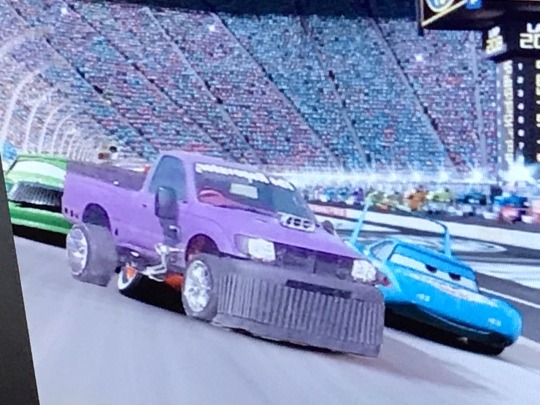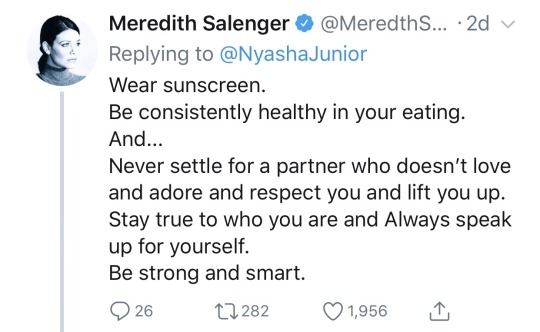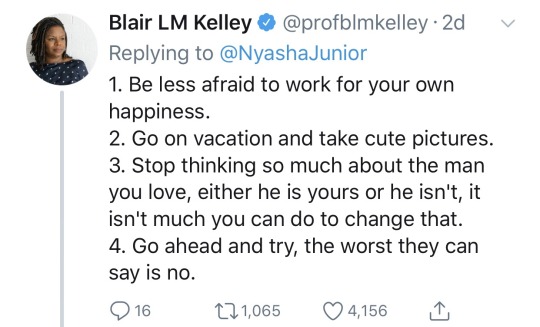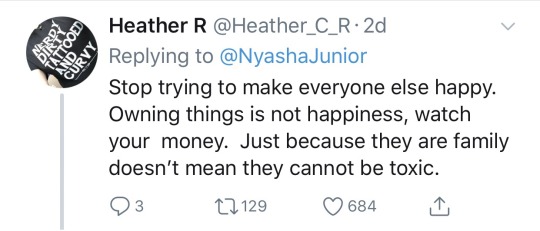Video
okay but things that are tragically funny in High School Musical 2:
Troy Bolton being weird and passive-aggressive because he thinks his gay classmate, Ryan, is trying to steal his girlfriend
Ryan not picking up on this heterosexual bullshit and being genuinely baffled when his polite small talk doesn’t get the expected reaction
220K notes
·
View notes
Text
As an introvert, once u find someone that u enjoy spending time with just as much as u like being alone, that’s a big fucking deal
78K notes
·
View notes
Text
ok universe, i’m ready to feel good things. make me feel good things.
2M notes
·
View notes
Photo








have a masterpost of cute bug friends in these trying times
image sources: [scarab] [sawfly larva] [silk moth] [velvet worm] [ambush bug] [weevil] [froghopper larvae] [chafer beetle]
4K notes
·
View notes
Text
It is theoretically possible to actually meet the people from Supernatural
Here’s why:
multiverse theory is a legitimate thing
that means infinite universes
legit anything is possible
in Supernatural, parallel universes are a thing
they have found ways to travel between them
this means that if there is a Supernatural universe (which is theoretically possible) and they have the ability to travel between universes there
they could come to ours
science
614 notes
·
View notes
Photo

Before Annie Leibovitz and Margaret Bourke-White, there was Jessie Tarbox Beals (1870–1942). A pioneer of photojournalism in the late 1880s and early 1900s, Beals is recognized as the first woman photographer hired on a newspaper staff. In 1902, after she had proven herself as an accomplished freelance photographer (and taught her husband the trade), Beals joined the staff of The Buffalo Inquirer. But she didn’t stay long. She left her post at the paper after 18 months to attend the St. Louis World’s Fair with her husband Alfred. Jessie had to push officials at the fair to give her a photography permit, and once she did she became an accredited photographer for the New York Herald and other papers. During her six months at the fair, she became something of a celebrity herself, taking pictures of luminaries such as President Theodore Roosevelt and his oldest son, Theodore Jr. Following her success in St. Louis, Jessie was ready to take on New York. In 1905, she and her husband moved to Manhattan and eventually set up their own studio; Jessie took pictures, while Alfred managed the business. Hustling for clients, Jessie went so far as to write to prominent people who were listed in the Social Register and offer to take their portraits without charge. Her labor paid off. The business survived, and in 1906, she and other women photographers were featured in a group show sponsored by the Camera Club of Hartford, Conn. In the show’s announcement, Beals was singled out for special recognition. But all was not well on the home front. While Jessie enjoyed the bohemian life in Greenwich Village—where she was friendly with Sinclair Lewis, Edna St. Vincent Millay, Eugene O’Neill, and other artists—her husband was more reclusive. They began to lead separate lives, and by the time Jessie gave birth to her daughter Nanette, in 1911, there was some dispute whether Alfred was the child’s father, though he doted on her throughout his life. In an era when most women chose children or careers, Beals managed both, however imperfectly. Nanette was often cared for by friends or shipped off to boarding school, and mother and daughter didn’t live together until the daughter was 17. Ultimately, though, the daughter was loyal to her mother, publicizing her work and arranging for posthumous exhibitions and publications. Beginning in 1982, Nanette Beals Brainerd gave all of her mother’s papers and pictures to the Schlesinger Library at Radcliffe, where they’re available today to scholars and others interested in women’s history. Jenny Gotwals, lead manuscript cataloger at the Schlesinger, who processed Beals’s papers and photographs, points out that—unlike most photographers—Beals didn’t specialize in one area but took news photos, interior portraits, street scenes, and garden and house pictures. In Gotwals’ view, the photographer was indomitable. “She just soldiered on and did what she needed to do. That’s how she was able to accomplish so much.”
37 notes
·
View notes
Text
[Bring forth a Banshee]

((Before the Fall of Arthas))
All she remembered was darkness.
She floated, cold, much like the field that she had died on. A Warrior woman, cut down in her glory, lost to the dark of the Great Beyond. Moria Sunfall - the Last Daughter of House Sunfall of Quel’thalas - the apple of her father’s eye… dead.
“You thought you could have it all, did you?” A dark voice came, wrapping around her like a thick, woolen blanket. “Become your Father’s hero…a father who was disgraced for his loyalty to Kael’Thas and was placed into Exile.”
“Stop.” She pleaded.
“You are nothing.” The voice continued, a low growl edged his voice. “A pitiful waste of time and energy.” Dark, red eyes opened ahead of her. A toothy, wicked grin sliced the inky blackness.
“No, I’m not done yet…”
“This one…”
Came another voice, stern and muffled as if hearing someone speak while under water. She felt herself being pulled as if an invisible puppetmaster was tugging on her soul like a marionette. Her back arched and her head slumped forward. Dark energy pulsed around her.
“This one will do nicely.”
Suddenly, as if slammed into a wall, her soul reentered her body. She gasped loudly as if trying to draw breath. Her golden eyes had turned an ice blue, her blonde hair had lost its luster and became white. She sat up, breathing heavily and clutching her chest for a heart that didn’t beat. She reached up and wiped the dried blood away from her lips. She’d been dead…hadn’t she?

“Wh-Where am I?” She asked, her voice was raspy and reverberated along the stone walls. Glancing up, she saw robed men lost in a deep chant filled with dark words. “What’s going on?”
“Take this one away, when she is strong enough we will use her in the Lich King’s front line. She was hard to kill when she was alive.” A foreman ordered. She felt cold, clammy hands beneath her arms as a pair of men moved toward a containment cell. Too weak to fight, all she could do was go along. Placing her inside, they closed and locked the barred door behind them.
“No no, my love. You are not done yet…” The voice from the Dark chuckled wickedly. “You are only just beginning…”
10 notes
·
View notes
Text
She stepped onto the footstool and opened the kitchen cabinet. Inside, rows of little glass eyes glinted in the light of the torch in my hand. Without looking down at me, she held out a hand, and I gave her the torch, which she immediately raised up to the cabinet. The eyes rolled, turned into little bottles with white caps and teal-and-orange designs.
“Should be one here somewhere,” she said, and even her maple syrup hair looked dark, a mass of tangled wood and brush. Her hand was in the dragon’s mouth, performing arcane dentistry with a torch. Rows of teeth, each with a different scent.
“Are you looking for a candle?” I asked. I couldn’t tell what was more unnerving, the lack of sound, or the absolute stillness of everything around us. Even the grass of the lawn outside refused to sway, like it was petrified.
“No,” she said, “I don’t keep candles. Too old-fashioned and— oh, hello there.”
Her fingers picked out a bottle from somewhere in the back of the cabinet. As she tried to bring it out of the cabinet, her sleeve brushed across the bottles in the front, causing them to come tumbling out en masse.
I caught a few in my hands, but most fell to the white tiles of the floor, smashing, bleeding their juices. Murky, oily fluids of dark colours swirled and kissed each other, mixing into one another.
“Oops,” she said.
I placed the bottles in my hand on the counter, then took the bottle she handed me. She stepped off the footstool and put it aside.
“I wouldn’t drink that stuff if I were you,” she knelt and examined the mess made on the floor. “Hell, I wouldn’t touch it. Wouldn’t even imagine it exists. Disgusting muck, let it take the house.”
She lit the floor with the flashlight, and I carefully stepped over to the other side. We left the house and sat on the porch, where the wind greeted us with a fleeting hug. The grass finally moved with the wind, and the sky was a deep sea blue.
“You don’t think we’re going to get in trouble for those smashed bottles, do you?” I asked.
She looked at me with a dumb grin. “Why would we? It’s my house.”
“But those are your mom’s bottles.”
“They’re not my mom’s bottles because I don’t have a mom, I have a mother. And two, my mother is dead. So if she wants to dig herself out of her grave and come crawling or shambling or fucking rolling like a ball at us, then so be it.”
“I don’t know,” I said, putting the bottle in my pocket. “I just feel all kinds of weird when I see smashed glass. Like bad luck just spread everywhere, you know? Like the bottles held all the bad luck in check.”
“Bottled bad luck,” she licked her lips and got up from the chair. “I like it. But then how come no one ever bottles good luck?”
I looked at the bottle again.
29 notes
·
View notes
Text
The stories I have written:
1) Sand Wasp: A, frankly highly personal, ‘southwest mysticism’ story that follows a young person as they set out to confront the Diety that cursed them with the inability to love. Honestly most of the story is world building and the creation of the mythology that runs it. Also has giant snakes. Beyond the Dieties and the Giants the cast includes talking animals, the protagonist, and their family.
2) Untitled: A lesbian love story in which a princess and a priestess are trying to win the attention of the (aromantic) lady knight who is trying desperately to set them up with each other and failing. (All three characters are lesbians and one of them is a trans).
16 notes
·
View notes
Text
The whales come from a different dimension, I’m told. They’re as small as sardines, and you can put them in, say, a wine glass quite easily, provided there’s enough water for them. Adorable creatures—put them in a bowl they make wonderful presents for little girls.
But their use in industry is more for their flammable bodies. A whale lamp can last for months and can last even longer if you coat the whale bodies with an oil made of fairy ash. However, no company actually manufactures coated whale lamps—a combination of market forces, coercion and regulation (thanks to fairy activists).
To actually create the whale lamp, the spark must be lit by a trained wizard such as myself. First, the glass is loaded onto the assembly line and filled with seawater collected from the same dimension as the whales.
The whales and seawater are collected through portals. You can never predict where the portal will open up on the other side, so we often just end up with a lot of earth or air instead of seawater. It sometimes takes several tries to get a portal somewhere in the ocean.
A pyramidal lid is placed on the whale lamp, and it contains a small whole at the tip. As it approaches me, I pull out my box of matches. These aren’t your usual matchsticks, mind you. They’re industrial matchsticks made out of crushed pearls, soot, smashed toys and earwax collected from imprisoned witches. Very expensive tools. A single matchstick costs more than what I make in a day.
The matchstick zings to life, and a green-pink flame dances at the edge of the tip, as if it’s struggling to balance. Industrial matchsticks burn fast, so I have no time to admire them, of course. I wait a second for the whale lamp on the assembly line to reach my left hand.
Gripping the lamp firmly, I drop the matchstick into the whole on top of the lid. The fire crackles, sending out bolts of light in every direction, and the lamp comes alive: bright yellow light, a portable sun. It’s warm to the touch now, and I pick up the lamp by the metal ring around the lid.
The whale screams, and it will continue to scream for the duration of the lamp’s life. A low-pitched hum, it is inseparable from the whale lamp. Every customer expects it. One day, perhaps they’ll invent silent whale lamps.
I transfer the lamp onto the higher line, which means that it is ready to be finished. If I don’t do this, the lamp drops off into a chute at the end of the lower line. From there, it falls into a a deep hole, at the end of which it smashes and is consumed in the very flames that are used to forge the iron frames of the lamps, amongst other products.
Another match lit, but I’m distracted. I lit the match to early. I reach for the lamp approaching me, but it’s too far, and the match is already half-gone. I try to put it in, but my fingers start to burn, so I shake it off.
That’s a match wasted. I sigh, and light another one.
43 notes
·
View notes













